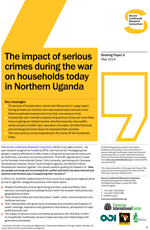In 2012/13, the Secure Livelihoods Research Consortium (SLRC) implemented the first round of an original sub-regional panel survey in northern Uganda aimed to produce data on livelihoods, access to and experience of basic services, exposure to shocks and coping strategies, people’s perceptions of governance, and the impact of serious crimes committed during the Government of Uganda and Lord’s Resistance Army conflict.
Main findings include:
- 55 percent of households in Acholi and 28 percent in Lango report having at least one member who has experienced a serious crime. Most households experienced more than one serious crime.
- Households with members experiencing serious crimes are more likely to have on-going war-related injuries, less food security, less wealth, worse access to healthcare, education and water, and feel that local and central government do not represent their priorities. The more serious crimes experienced, the worse-off the household today.
- We estimate that between 131,573 and 199,121 people were violently killed or forcibly disappeared by parties to the GoU and LRA conflict. There has been practically no follow-up to determine and mitigate the ongoing impacts of these crimes on their households.







